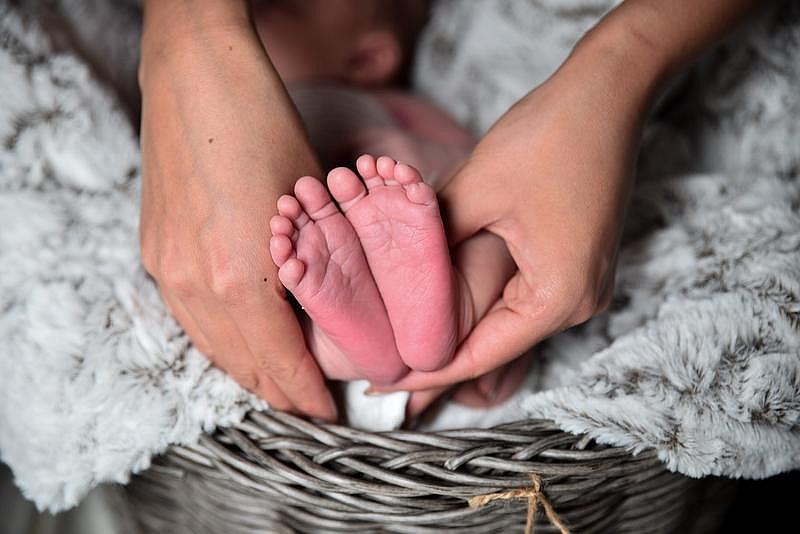In motherhood, a chance to break the cycle of addiction
This series, Enduring Addiction, was produced as a project for the Dennis A. Hunt Fund for Health Journalism and the 2016 National Fellowship, programs of the Center for Health Journalism at the USC Annenberg School for Communication & Journalism.
Other stories in the series include:

Creative Commons / Pixabay
Española has had one of the highest rates of heroin addiction in the country for decades. It’s a public health crisis that can create particular challenges for pregnant moms and the doctors that treat them.
Monica, a new mom, works at a restaurant in Española. She told me this story about a recent night when she was waiting tables.
“When he was about to leave, he handed me a paper and he was like here you go ma’am, here’s your tip.”
Monica is recovering from heroin addiction—she didn’t want to give her last name because she said a lot of her friends and family still don’t know she had a drug problem.
“So I go to the back, I open the paper, and it’s drugs, he handed me drugs. And I was like oh my god, I can’t believe he just gave me this!”
Monica didn’t use the drugs that day. She turned them in to her manager, because she said she doesn’t want her young daughter to have an addicted parent. But her story shows just how hard it can be to stay clean in Española, where it can feel like heroin is everywhere. If you want some, Monica said, you just have to walk down the street and ask.
“Because mentally you want to go out there and use, but then you have your child,” she said. “And I’m not gonna lie and say that throughout my pregnancy I never used, because I didn’t find out I was pregnant till I was like two months pregnant, and I was using at the time.”
There are a lot of women in Monica’s shoes in this community. And like Monica, many of them try to get help with their addiction when they find out they’re going to have a baby.
But even though Española has led the nation in opioid addiction and overdose rates for years, basic services like detox, treatment, counseling and medical care are out of reach for a lot of people here.
Add to that high rates of poverty, and you’ve got a recipe for a major public health crisis.
“What comes to mind for me is the level of chronic stress that undoubtedly pervades that community,” said Dr. Anthony Iton. He studies the impacts of poverty and inequality in communities like Española at the California Endowment.
“People are constantly in this state of imbalance where their needs and the risks that they’re facing so dramatically outweigh their resources or assets that they have at their disposal,” he said. “And over time that changes people’s physiology.”
The science shows that those changes in physiology make people more susceptible to taking drugs, Iton said, and can make getting off drugs even harder.
Which helps explain why addiction runs so deep here. When drug abuse and all the trauma it causes becomes the norm in family and social life, people become physically predisposed to addiction even before they start experimenting with drugs.
Without the right support, it gets passed down from generation to generation.
Monica’s doctor, Leslie Hayes, specializes in working with addicted moms.
“A large number of them were raised in households with addiction or with sexual or physical abuse, or have domestic violence in their past,” she said. “ So pregnancy is not where it starts certainly.”
But it can be a good place to break the cycle. Hayes said most of the moms she sees try hard to quit when they find out they’re pregnant. Getting those new moms the help they need to break their heroin addictions and stay drug-free later could make a big dent in Española’s drug crisis.
“My mothers with opiate use disorder are some of the most attentive mothers in my practice. I’m always kind of astounded,” she said. “So once they get opiate-free, these women actually generally do quite a good job with parenting.”
But Hayes said New Mexico has fallen way short in getting mothers the help they need to stay opiate-free. There’s a serious shortage of doctors and counselors in this part of the state, and family and social services for new parents are underfunded.
Monica said that’s not going to stop her from raising her daughter the best she can.
And research shows that kind of family support is one of the most important ways to buffer kids’ risk of addiction.
“I mean I plan on talking to her, just like any parent would,” she said. “I can obviously tell her about my own experience. I strongly believe that if she was ever to become an addict, I feel like I would help her all the way.”
She said when the time comes to talk about addiction, she’ll be ready.
[This story was originally published by KUNM.]

